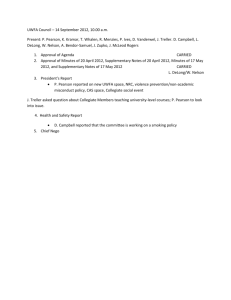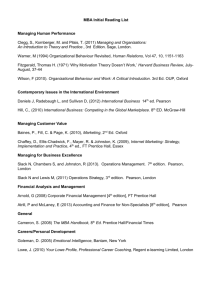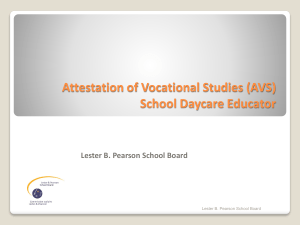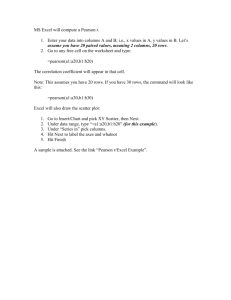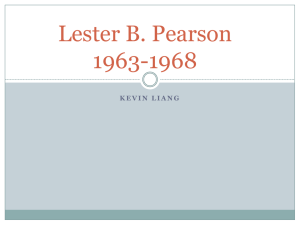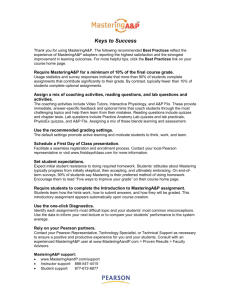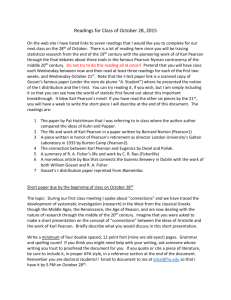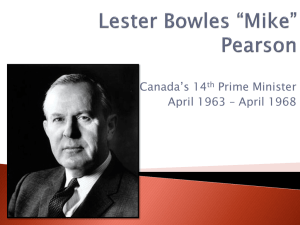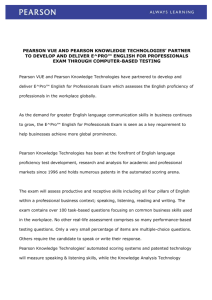GEOFFREY PEARSON, 80: DIPLOMAT
advertisement
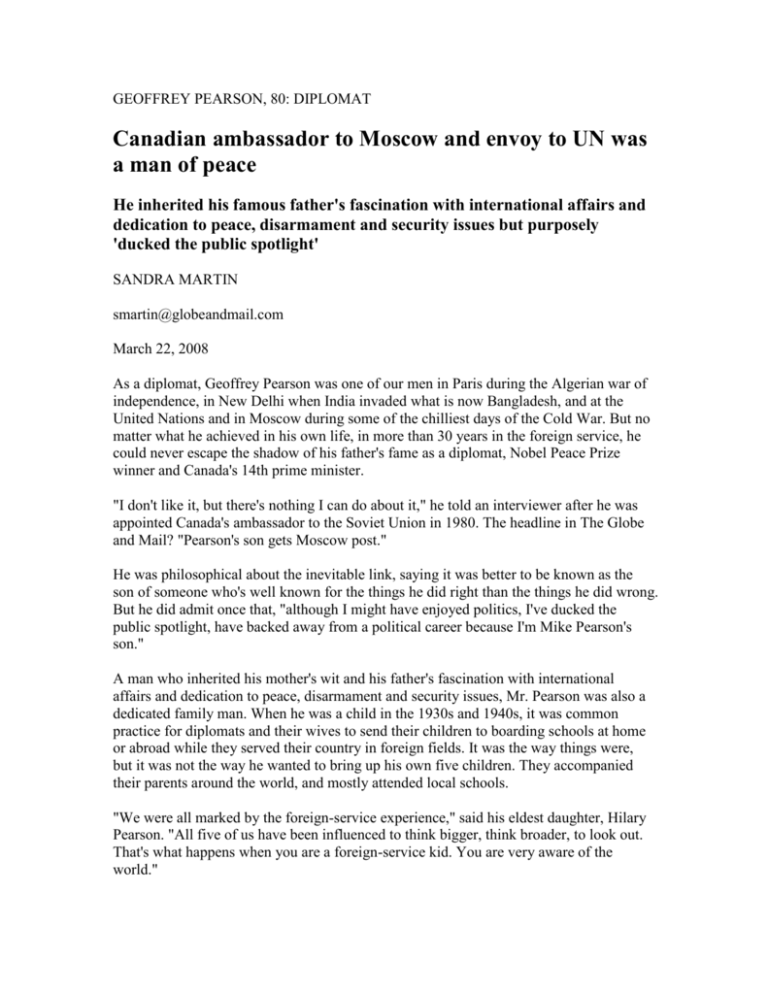
GEOFFREY PEARSON, 80: DIPLOMAT Canadian ambassador to Moscow and envoy to UN was a man of peace He inherited his famous father's fascination with international affairs and dedication to peace, disarmament and security issues but purposely 'ducked the public spotlight' SANDRA MARTIN smartin@globeandmail.com March 22, 2008 As a diplomat, Geoffrey Pearson was one of our men in Paris during the Algerian war of independence, in New Delhi when India invaded what is now Bangladesh, and at the United Nations and in Moscow during some of the chilliest days of the Cold War. But no matter what he achieved in his own life, in more than 30 years in the foreign service, he could never escape the shadow of his father's fame as a diplomat, Nobel Peace Prize winner and Canada's 14th prime minister. "I don't like it, but there's nothing I can do about it," he told an interviewer after he was appointed Canada's ambassador to the Soviet Union in 1980. The headline in The Globe and Mail? "Pearson's son gets Moscow post." He was philosophical about the inevitable link, saying it was better to be known as the son of someone who's well known for the things he did right than the things he did wrong. But he did admit once that, "although I might have enjoyed politics, I've ducked the public spotlight, have backed away from a political career because I'm Mike Pearson's son." A man who inherited his mother's wit and his father's fascination with international affairs and dedication to peace, disarmament and security issues, Mr. Pearson was also a dedicated family man. When he was a child in the 1930s and 1940s, it was common practice for diplomats and their wives to send their children to boarding schools at home or abroad while they served their country in foreign fields. It was the way things were, but it was not the way he wanted to bring up his own five children. They accompanied their parents around the world, and mostly attended local schools. "We were all marked by the foreign-service experience," said his eldest daughter, Hilary Pearson. "All five of us have been influenced to think bigger, think broader, to look out. That's what happens when you are a foreign-service kid. You are very aware of the world." Geoffrey Pearson was born in Toronto on Christmas Day, 1927, the elder child and only son of Lester Bowles Pearson, then a lecturer in modern history at the University of Toronto, and his wife, Maryon Elspeth (née Moody) - at least that's the official version. In fact, Dr. William (Billy) Dafoe delivered the baby at 11:58 p.m. on Dec. 24 and, being an obliging fellow, agreed to register the time of birth as 12:02 a.m. the following morning, according to historian John English in Shadow of Heaven, the first volume of his biography of Lester Pearson. By the time, Geoffrey entered Trinity College School in Port Hope, Ont., at 14, he had attended, by his count, five schools, including Ravenscourt in Winnipeg and Ashbury in Ottawa. At TCS, he was dubbed Joker because of his poker face. "He yawned his way to the sixth form and left with a well-earned scholarship to Varsity," reported the TCS yearbook for 1945, while also paying tribute to his sportsmanship, his dry wit, and his responsibility as a house prefect. Geoffrey had to sit out a year before university because he had contracted tubercular pleurisy. He spent months in the sun in Bermuda at a school friend's house and then in Arizona at a ranch belonging to one of his father's American colleagues, where he learned to ride horses and explore the desert. He enrolled in Trinity College at the U of T in 1946, studying history under Frank Underhill and Donald Creighton. Along with his friend Mike Mackenzie, he spent the summer of 1948 as a cadet officer on a merchant-navy steamer, with responsibility for collecting garbage, making tea for the officer who stood the 4 a.m. watch and cleaning the ship's whistle, a task that involved climbing a 10-metre ladder braced against the ship's funnel. They stopped at major ports on the English Channel and, while the ship was docked, they made quick excursions into England, the Netherlands, Belgium and Germany (where they had an adventure when an army friend tried to take them through Berlin on the day the Russians imposed a blockade). The following summer, he attended an international student seminar in the Dutch city of Breda, where he edited the Breda News and perhaps anticipated his future diplomatic career when he summed up the experience by opining that, for five weeks, he and the other students had "formed an international community ... conscious not so much of having fully comprehended the problem of liberty and order as of having understood the bases on which an eventual solution to it must be built." Before returning to university for his final year, he and Lucy Landon Carter Mackenzie, a Trinity student and the younger sister of his friend Mike, became an item. He graduated in 1950 and went to Oxford on a Massey scholarship. She graduated the following year and moved to London to work as a tutor to the daughter of Dana Wilgress, then the Canadian high commissioner. Ms. Mackenzie and Mr. Pearson travelled back to Canada at her parents' request - where they were married in a private ceremony at her family home in London, Ont., on Boxing Day, 1951. They both returned to Oxford, where, in 1952, he completed his MA in philosophy, politics and economics. That summer, he wrote the exams for the Department of External Affairs, one of two dozen successful candidates in a field of more than 250 applicants. A year later, he was posted to Paris as third secretary. After four years in France - years in which Canada was a member of the International Control Commission trying to oversee France's withdrawal from Indochina, the Algerian war began, the Suez crisis erupted and the first two of his five children were born - the Pearsons returned to Ottawa. By all accounts, 1957 was a busy year: their third child was born; the Louis St. Laurent Liberals were defeated by John Diefenbaker's Progressive Conservatives; his father won the Nobel Peace Prize and was subsequently chosen leader of the Liberal Party. All in all, Geoffrey Pearson "accepted with alacrity," as he writes in Anecdotage, his privately printed memoirs, a secondment to work in the political division of the NATO Secretariat, an invitation that would take him away from Ottawa. The secondment ended in June of 1961, by which time the Pearsons had produced their fourth child and only son. Mr. Pearson was offered the No. 2 job in the Canadian embassy in Mexico under ambassador Arthur Irwin, a former editor of Maclean's, director of the National Film Board and the husband of poet P. K. Page. The posting - Mr. Pearson describes his duties in Anecdotage as part academic, part consular and part diplomatic - lasted until the summer of 1964. By the time they returned to Ottawa, their fifth child had been born, they had learned to speak Spanish, and Mr. Pearson's father was prime minister. For the next three years, he worked in Ottawa in the UN Division of External Affairs. He went twice to New York as an adviser to the Canadian delegation but was mainly engaged in helping to shape our policies on peacekeeping. These were the years when the Americans under Lyndon Johnson were becoming heavily involved in the un-winnable Vietnam War. After Lester Pearson retired from politics in 1968, Geoffrey took a leave to arrange his father's papers and to work with Norman Robertson and G. S. Murray on a historical study of Canadian foreign policy. In the summer of 1969, the Pearsons were off again, this time to New Delhi, where he served until 1972 as deputy high commissioner. During his tenure, India invaded East Pakistan - which led to the establishment of Bangladesh and conducted what it called a "peaceful" nuclear test. After his posting ended, Mr. Pearson spent the 1972-73 academic year in Vancouver as a visiting professor at the University of British Columbia. From 1973 to 1980, the Pearsons were back in Ottawa, where Geoffrey was in charge of the policy analysis group at External Affairs, then director-general of the UN Division of External Affairs. He was also heavily involved in the posthumous completion of his father's memoirs - Lester Pearson had died of cancer in December of 1972 - and in the planning for the Lester B. Pearson College of the Pacific, one of 12 United World Colleges around the globe. While at the UN bureau, he had a hand in drafting the speech that Pierre Trudeau delivered in the General Assembly on May 26, 1978, outlining a strategy to suffocate the arms race by "depriving" it "of the oxygen on which it feeds" by, among other things, prohibiting the production of fissionable material. That call was eventually incorporated in the first resolution passed by the General Assembly on that subject. About this time, Mr. Pearson was shifted again, so he could work directly under external affairs minister Donald Jamieson as adviser on disarmament and arms control affairs. In an interview with The Globe, Mr. Pearson said: "The Canadian people are not up in arms (no pun intended), but there is more interest than there was before," referring to the priority that Mr. Trudeau had placed on increasing Canadian efforts to curb international arsenals of nuclear and conventional arms. In June of 1980 (less than a year after the Soviet Union had invaded Afghanistan), Mr. Trudeau named him ambassador to Moscow, an appointment that Mr. Pearson, then 53, described as a total surprise. After postings in Paris, Mexico City and New Delhi, he spoke Spanish and French, but he had never studied Russian. Mr. Pearson's commitment to peace and disarmament and his background and expertise earned by working for NATO and the UN were far more significant than language skills to a prime minister interested in carving an international legacy for himself as a peacemaker. As Mr. Pearson quipped at the time: "There's no sense sending someone to Moscow who's an expert on trade." He was recalled to Ottawa in the fall of 1983 to serve as Mr. Trudeau's special representative on arms control. After Mr. Trudeau resigned as prime minister in 1984, Mr. Pearson launched an international peace initiative that he hoped would defuse the Cold War between Washington and Moscow. The plan included proposals for a summit of the five nuclear powers, a renewed and strengthened non-proliferation treaty, a ban on highaltitude, anti-satellite weapons and restrictions on the mobility of intercontinental missile launchers. While Mr. Trudeau liaised personally with the British and Commonwealth countries, he asked Mr. Pearson to sell the proposal to Chinese and Soviet leaders. The Moscow initiative was hampered by the prolonged ill-health of Soviet leader Yuri Andropov, who was hospitalized after suffering renal failure in February of 1983. In February of 1984, Mr. Trudeau met Mr. Andropov's successor, Konstantin Chernenko, for a brief and inconclusive discussion. That year, the Soviets boycotted the Summer Games in Los Angeles, at least partly in retaliation for the U.S.-led boycott of the Moscow Games four years earlier. Mr. Pearson resigned from External Affairs in 1985, after more than 30 years service, and accepted an appointment as inaugural executive director of the Canadian Institute for International Peace and Security, a think tank on disarmament and security issues that was established with $1.5-million in start-up funds from the federal government. He held the post for more than four years. Mr. Pearson wrote a book about the early years of his father's career, Seize the Day: Lester B. Pearson and Crisis Diplomacy, which was published in 1993. John English, reviewing it for The Globe, described the book as "clearly written" and "as much a tract for our times as a history of postwar Canadian diplomacy." According to Mr. English: "What [Geoffrey] Pearson admires in his father's generation and times is the creativeness of Canadian diplomacy and the fundamental commitment to the UN as a symbol of moral leadership and a place for diplomatic opportunity. That generation 'seized the day' in dangerous times, and the world and Canada were better for it." In 2000, Mr. Pearson was made an officer of the Order of Canada, the country's highest civilian honour, a designation that had been established in 1967 when his father was prime minister. He spent his last years in Ottawa with his wife, working on Anecdotage with the help of his daughter Hilary. At his 80th birthday party last summer - he didn't like celebrating himself on Christmas Day - he gave each member of his family a copy of his version of his life. GEOFFREY PEARSON Geoffrey Arthur Holland Pearson was born in Toronto on Dec. 25, 1927. He died in his sleep at his Ottawa home on March 18, 2008. He was 80. Mr. Pearson is survived by his wife, retired senator Landon Pearson, and by their children Hilary, Katharine, Anne, Michael and Patricia. He also leaves his younger sister, Patricia Hannah, and 12 grandchildren.
